Knowledge and passion

It’s difficult to sum up the first-ever FOCUS Conference. In a word we would call it “successful”, but it was so much more than that … GAVIN MYERS gives you the “executive summary”
Other than the announcement of the Truck Test 2015 results by Hellberg Transport Management’s Martin Dammann (see the May edition of FOCUS), a wealth of valuable, rich information was afforded by the four main speakers – along with the obligatory laughs, of course. Each one is an industry expert in his own right, and the 200-strong audience therefore derived maximum value.
The wealth of knowledge, insight, experience, passion, humour and wit that was imparted made for an industry event that proved to be both jovial and practical.
Taking out the rats and mice
Adrian van Tonder, chairman of the national Road Transport Management System (RTMS) steering committee, was first up with a brief presentation highlighting the new consignee/consignor legislation that became effective on February 1.
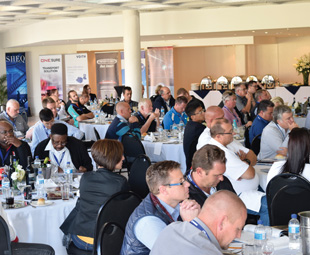 Whereas, in the past, the responsibility to move goods safely lay with the transport company, the new legislation has changed this to make the consignee/consignor responsible for what their transporter does on the road, and to ensure that the transporter acts within the regulations of the Road Traffic Act.
Whereas, in the past, the responsibility to move goods safely lay with the transport company, the new legislation has changed this to make the consignee/consignor responsible for what their transporter does on the road, and to ensure that the transporter acts within the regulations of the Road Traffic Act.
“The consignee/consignor can no longer outsource his responsibility – if a vehicle is running overloaded, both he and the transporter will be held liable. This is a huge shift … it’s been a long time coming and I’m glad it has happened,” Van Tonder notes.
“It will start taking the rats and mice out of the industry – those that are operating at stupidly low rates, with illegal vehicles and drivers who are not well trained, as well as consignees who force down the rates of the transporters. The burden now lies on them to make sure they have sustainable transporters moving their goods. That is good for the industry.”
Van Tonder explains that should an MD of a consignee company not take reasonable steps to ensure that the transporter abides by the rules, he can be held responsible in his personal capacity. “If the consignee is found to be in contravention of the act, the person responsible will be held liable and could face jail time,” he explains.
Section 75B of the legislation dictates that well-documented proof of such policies, procedures and steps taken to prevent vehicles from being overloaded need to be kept.
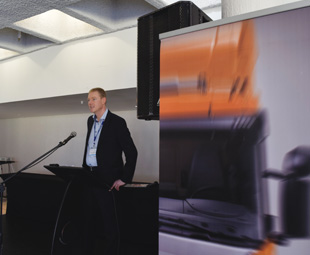 It is also required that a goods declaration be kept in each vehicle, which needs to detail, among other things: the nature and quantity of goods transported; the contact particulars of the operator – or, in the case of a combination of vehicles, of every operator in the combination of vehicles; the particulars of the consignor and consignee of the load – or, in the case of loads collected at and delivered to more than one consignor and consignee, the particulars of every consignor or consignee; the name, residential and postal address of every natural person – or, in the case of a juristic person, the responsible director or member, an agent, consignor, consignee, or operator, listed in the declaration; a schedule of insurance; and a written agreement between consignor and operator for the transportation of goods stating the nature of the agreement, the loading instructions and the responsibilities of the parties.
It is also required that a goods declaration be kept in each vehicle, which needs to detail, among other things: the nature and quantity of goods transported; the contact particulars of the operator – or, in the case of a combination of vehicles, of every operator in the combination of vehicles; the particulars of the consignor and consignee of the load – or, in the case of loads collected at and delivered to more than one consignor and consignee, the particulars of every consignor or consignee; the name, residential and postal address of every natural person – or, in the case of a juristic person, the responsible director or member, an agent, consignor, consignee, or operator, listed in the declaration; a schedule of insurance; and a written agreement between consignor and operator for the transportation of goods stating the nature of the agreement, the loading instructions and the responsibilities of the parties.
“A lot of this is about overloading, which, to me, is a bit sad, because I would have loved to have seen this legislation extend to roadworthiness and other aspects of drivers and driver training. A truck running without brake linings is sometimes a much bigger problem than overloading …” Van Tonder adds.
Nonetheless, it’s encouraging to note that, in the few months that the legislation has been enacted, compliance has begun to happen automatically. “Speaking to people from the Department of Transport (DoT), the legislation is being taken seriously and there is a reduction in overloading, so it’s having an impact without even being enforced yet.”
Aiming for 100-million kilometres
Paul Nordengen, principal researcher and research group leader at the Council for Scientific and Industrial Research (CSIR) Built Environment, has become a household name in the industry, thanks to his work in driving the Performance Based Standards (PBS) concept. He gave a talk entitled: “Slashing transport costs and improving truck safety the SMART way”.
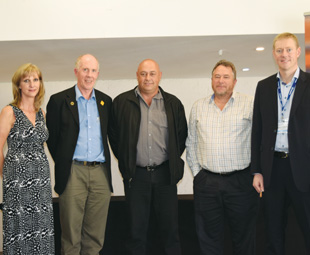 “The challenge with designing and operating trucks is that the objective is to maximise productivity, but there are the obvious constraints of safety and protecting the infrastructure. The way one normally ensures that these issues are dealt with is through prescriptive regulations; to ensure that trucks are safe on the road and don’t cause undue damage,” he begins.
“The challenge with designing and operating trucks is that the objective is to maximise productivity, but there are the obvious constraints of safety and protecting the infrastructure. The way one normally ensures that these issues are dealt with is through prescriptive regulations; to ensure that trucks are safe on the road and don’t cause undue damage,” he begins.
“The reality is that this approach has weaknesses. Although vehicles on the road comply with regulations, they are either not really safe, or cause a lot of damage.”
In short, while the prescriptive approach is about defining the size and mass of vehicles, the PBS approach tries to develop a performance envelope that takes into account these safety and infrastructure requirements and the design of vehicles (that may not necessarily comply with prescriptive regulation). These are checked using various analysis techniques to comply with acceptable safety and infrastructure standards.
Importantly, the project is yielding significant results. In the seven-and-a-half years the project has been in operation, 106 operators have joined. Over 45-million kilometres have been completed with the PBS vehicles. The aim is for at least 100-million kilometres to be completed before PBS is introduced fully. During 2014 alone, 75 000 trips, 1,23 million litres of fuel and 3 400 t of CO2 were saved.
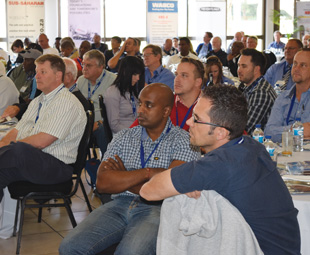 “Each operator also has to provide safety data of crashes every month, for their PBS and a selection of baseline vehicles on the same or similar routes. Between January 2008 and March 2015, smart trucks had 67 crashes and the baseline was 377,” Nordengen smiles.
“Each operator also has to provide safety data of crashes every month, for their PBS and a selection of baseline vehicles on the same or similar routes. Between January 2008 and March 2015, smart trucks had 67 crashes and the baseline was 377,” Nordengen smiles.
The project began in the timber industry. Today 22 percent of all timber is transported by PBS trucks. “On average, this industry has seen a fuel saving of 14 percent,” Nordengen says.
Mining is another sector in which the project is showing results. Unitrans was running B-tripple road trains for ten years and then upgraded to a 43-m-long four-trailer combination with a gross combination mass of 185 t.
PBS also assisted Buscor, which had also been running bi-articulated buses. Nordengen explains: “The PBS committee felt it should run assessments to check compliance, and three of the standards failed. The solution was to reposition the rear axles on the articulations and increase the wheelbases.”
Nordengen says that vehicles in the car carrying industry now also have to follow a new road map. This was approved just over a year ago by the abnormal loads committee, and vehicles must be RTMS certified and PBS compliant. “There are about 200 new vehicles on the road now and the old ones have until April 2023 before their permits expire,” he notes.
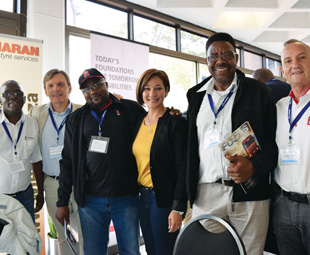 “We are doing the PBS project to improve productivity. It results in less investment by reducing the number of trucks doing a particular task and also improves fuel efficiency per tonne of payload. There are other impacts, however, such as reduced congestion and safety risks. As part of our pilot project we’re also looking at roads and bridges and we’re using the performance-based approach for road wear and damage, which is our own local design, to do reverse engineering …”
“We are doing the PBS project to improve productivity. It results in less investment by reducing the number of trucks doing a particular task and also improves fuel efficiency per tonne of payload. There are other impacts, however, such as reduced congestion and safety risks. As part of our pilot project we’re also looking at roads and bridges and we’re using the performance-based approach for road wear and damage, which is our own local design, to do reverse engineering …”
He explains: “By looking at the actual road wear of a tyre configuration, one can be selected one that results in consistently low road damage per tonne of payload. When conforming only to the prescribed regulations, vehicles could be doing more than double the damage per tonne of payload.”
It all sounds very promising, because it is. “We’ve had a lot of feedback from operators and drivers saying they prefer running and driving these vehicles. We’re also finding that some of the trailer manufactures and original equipment manufacturers (OEMs) are learning things about the way they design and build their vehicles to get better performance.
“We still want to undertake a project that will assess the current heavy vehicle fleets. We would take a selection of 20 or 30 typical combinations on the road and identify, and try to phase out, certain combinations that are particularly bad,” he concludes.
A rich, historic, complex cultural life
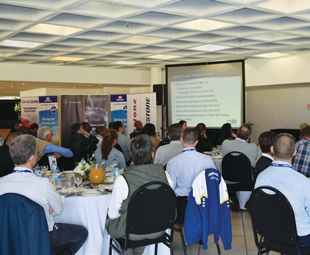 It’s perhaps fair to say that Jim Ward’s speech, entitled: “Transport – an industry in balance”, was the most gripping of the day. Ward is the technical manager at Unitrans Logistics. Almost controversially, he used the concept of culture to drive his point home.
It’s perhaps fair to say that Jim Ward’s speech, entitled: “Transport – an industry in balance”, was the most gripping of the day. Ward is the technical manager at Unitrans Logistics. Almost controversially, he used the concept of culture to drive his point home.
“Our culture is woven through our life, and life is richer for it. We work with technology, but we also work within a rich, historic, complex cultural life. Our culture is one that values people – and we should cherish that. If you claim that people are the most important asset in your company, then you have to demonstrate that in your workplace …” he says.
Of course, given the context of South Africa’s uniqueness, this often requires a bit of effort and understanding.
“I laugh when I hear people talk about working in Africa as opposed to here. Where do they think they are now?” Ward asks to the accompaniment of a laugh from the audience.
“This is still a relatively new country; so much of what we do is new to the people doing it. Somewhere, every day, is a driver climbing into a truck for the first time – and he or she will drive it on public roads.
“Our drivers have different levels of experience; our roads vary from awful to excellent; our distances are longer; our loads are heavier; our temperatures vary greatly (even in one trip); we face altitude changes on single routes; we cannot stop safely on the side of the road at night; we often encounter other vehicles parked dangerously or making u-turns on freeways; we’re often hundreds of kilometres from help; and, most of all, our culture plays a much stronger role in our work environment than it does overseas – where it has largely been forgotten with the passage of time,” he continues.
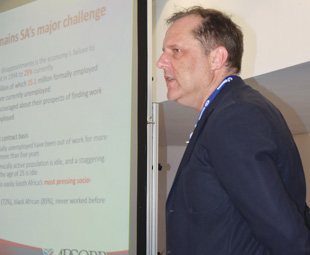 Ward explains that, on the one hand, we have a professional transport industry using first-world technology and state-of-the-art vehicles to service demanding clients, while, on the other hand, we are operating in a unique country with an amazing blend of cultures, differences, languages, history and a chronic lack of education. Our industry needs to balance all these aspects in daily operations …
Ward explains that, on the one hand, we have a professional transport industry using first-world technology and state-of-the-art vehicles to service demanding clients, while, on the other hand, we are operating in a unique country with an amazing blend of cultures, differences, languages, history and a chronic lack of education. Our industry needs to balance all these aspects in daily operations …
Illustrating how technology and our culture are worlds apart, Ward begins: “European truck makers love complex warning systems. The assumption is that the driver will pull into the nearest dealership, in the next village, and have it checked. This doesn’t work when you’re 250 km past Uppington heading due-west … in my experience most drivers just keep going.”
“If you break down in the Netherlands, help will be there in a few minutes. In the Eastern Cape, you might be there until the next evening – and minus a load. Nobody goes to breakdowns after hours because it’s too dangerous …”
Ward explains that, against the dollar, the rand is one of the most volatile currencies in the world, which is why our operators work according to lifecycle costings, and have to achieve a planned service life from the truck. “Here, we must fix, replace and rebuild things,” he says. It’s also why mechanics are often expected to produce high-quality safe repairs and fast turnaround times, while working on uneven, unpaved ground, in poorly lit conditions, using worn-out tools.
“Too often it’s our operations that take priority. Nowadays, contracts are secured by shaving maintenance and downtime razor thin,” Ward notes despondently.
Then, when something does go wrong, a further challenge is presented by our many languages. “There is no African word for a ‘leaking rear main-crankshaft-seal’ … there are few indigenous words to describe technical things. Fault codes do not translate well into Zulu,” says Ward.
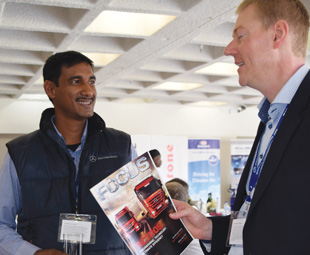 The problem here, he continues, is that genuine dialogue is needed between workers and their managers, and the cultural barriers between them need to be broken down. This seldom happens. If there is no dialogue between people, they will not fully understand what is required of them …
The problem here, he continues, is that genuine dialogue is needed between workers and their managers, and the cultural barriers between them need to be broken down. This seldom happens. If there is no dialogue between people, they will not fully understand what is required of them …
In this instance, says Ward, culture plays a role in everyday life and matters a great deal. “Let’s imagine a driver has been allocated his load for the day, at a depot where there’s very little in the form of dialogue or Ubuntu. He clocks in, but is not greeted, because his boss doesn’t know how important it is to greet or what it symbolises.
“When we say ’sawubona’ or its equivalent, it’s nothing like saying ‘hello’ – in the best way I can put it, it means: I see you as a person, you matter to me and I recognise your humanity. It’s very important to greet one another and offensive to not do so,” he says.
“People matter in this industry and we should never be too busy to remember that. It might be something as simple as calling the workforce together to honour the passing of a fellow staff member …
“Our challenge is choosing the most suitable technologies, but never losing sight of the fact that culture plays a great role in everyday life. Striving daily to achieve that balance is what makes this such an amazing industry in which to work,” he concludes.
The economy is going nowhere
Loane Sharpe, economist at the Free Market Foundation, was last to take the stage, to present some insight into our economy and the trends and future of the labour market. He began by noting that one of post-apartheid South Africa’s greatest disappointments is that the economy is failing to create jobs.
“In 1994, the unemployment rate was 13 percent and today its 25 percent. Of the 20,3 million people available for work, 15 million are formally employed, while 5,2 million South Africans are unemployed.
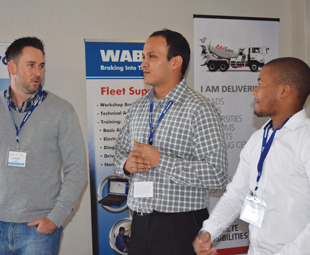 “A further two million are permanently discouraged about ever finding work and a million people are underemployed (available for more work than the economy can provide). A total of 8,7 million people are underutilised,” he explains.
“A further two million are permanently discouraged about ever finding work and a million people are underemployed (available for more work than the economy can provide). A total of 8,7 million people are underutilised,” he explains.
Sharpe continues to say that 3,4 million people (or 66 percent of those unemployed) have been out of work for more than a year, and 1,5 million (or 29 percent) have been unemployed for more than five years. “Nearly half of the economically active population is idle, and 75 percent of youth under the age of 25 are idle. It’s a national catastrophe and easily South Africa’s most pressing socio-economic problem,” he says.
According to Sharpe, one of the reasons for this is that we have had to economise on labour by automating and mechanising. “Since 1995, and the introduction of the Labour Relations Act (LRA), wages after inflation have risen dramatically.
“Businesses don’t mind giving five to ten percent increases, so long as those increases are matched, or exceeded, by gains in labour productivity. Since the introduction of the LRA in 1995, labour productivity in South Africa has collapsed – it’s now at the lowest levels since records began in 1967.”
Further, in the 2000s labour productivity became negative, meaning that for every worker added to the workforce, production dropped. Conversely, for every worker removed production increased.
“That’s the scary state of reality and shows how much we need to economise … Capital productivity has been the exact opposite – for every one percent the capital stock of a business is increased output increases by
0,4 percent,” says Sharpe.
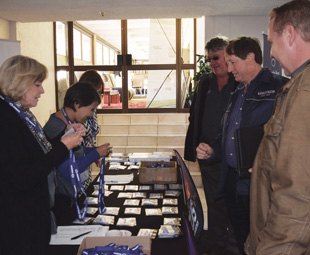 This “economising of people” is happening most in the labour-intensive primary sectors. “In 1994, the agricultural sector employed 2,1 million farm workers. Today, it employs only 670 000. Likewise, the mining sector employed 1,4 million, today it employs around 550 000,” he illustrates.
This “economising of people” is happening most in the labour-intensive primary sectors. “In 1994, the agricultural sector employed 2,1 million farm workers. Today, it employs only 670 000. Likewise, the mining sector employed 1,4 million, today it employs around 550 000,” he illustrates.
Nonetheless, there are some sectors that are creating jobs. Sharpe says that, despite the overwhelming number of job seekers, the South African economy has done incredibly well.
“The private sector is in tremendous shape, even though the public sector basically doesn’t exist. Don’t be anxious about the state of the government sector, as the private sector is in such splendid shape that the economy is unlikely to fail.”
Sharpe isn’t referring to massive listed companies, either (which employ only nine percent of the national workforce). It is the small and medium businesses, which employ 81 percent of the national workforce.
What about the new generation of labour that is creeping in, though? As Sharpe points out, on average a union member in South Africa is 43 years old. The average age of a job seeker today is 27. (This is also one of the reasons, he says, why union membership is in decline and will eventually dwindle and disappear.)
“The older people are concerned with job security. Young people are interested in job mobility – two totally different things. Young people in the workforce want individualised bargaining. The older workforce wants collective bargaining.
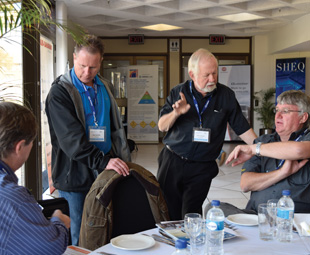 “Businesses are going to have to make this shift with clever employment contracts, many of which will be temporary, and workers will be heavily rewarded for productivity. Business has to prepare for those changes if it wants to survive in this catastrophic labour market,” Sharpe explains.
“Businesses are going to have to make this shift with clever employment contracts, many of which will be temporary, and workers will be heavily rewarded for productivity. Business has to prepare for those changes if it wants to survive in this catastrophic labour market,” Sharpe explains.
In summary, Sharpe notes that the farming and mining sectors are dead. Manufacturing, in some cases, will survive, but most of it will be gone in the next 15 years, while the services sectors (including transport and logistics) are growing rapidly with no signs of stopping.
“If you have a sizeable workforce, you’re going to have to replace it with technology, if possible, or use technology to monitor, measure, record and remunerate. It is possible to drive tremendous amounts of labour costs out of your environment.
“Companies must also start becoming innovative with regard to labour contracts and find better ways of getting young, capable, interested people into the workforce, who want recognition for their performance.
“Embrace affirmative action and black empowerment and find ways to access the growing black middle class, but do what is right for your business under your particular circumstances. Set your own targets and work towards them.
“The labour market is facing some very severe difficulties and things are going to have to be done very differently for it to survive,” he concludes.
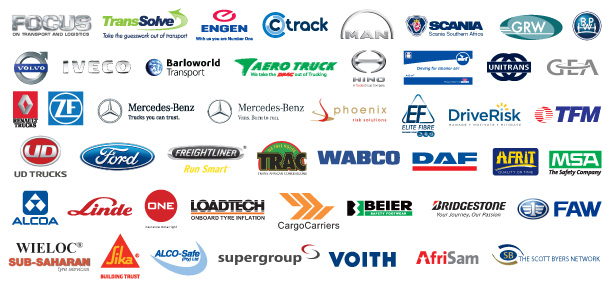
Published by
Focus on Transport
focusmagsa




